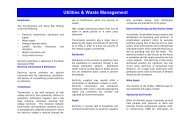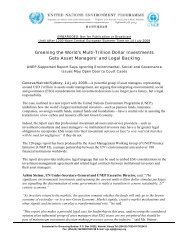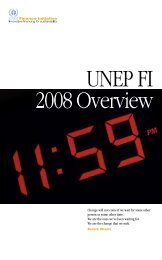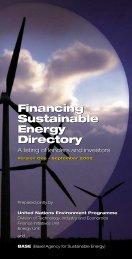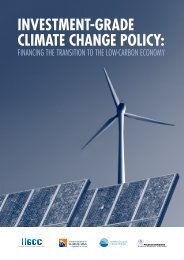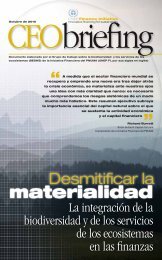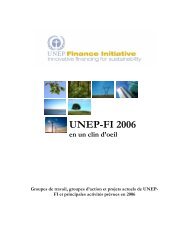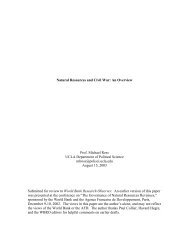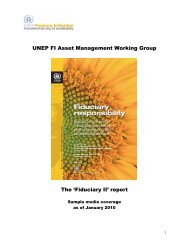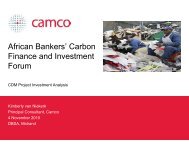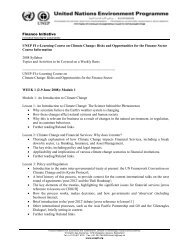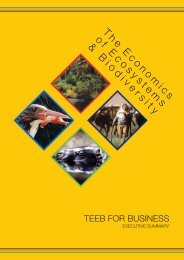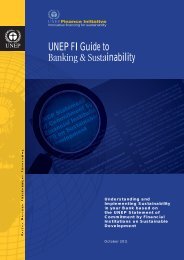Carbon 2009 Emission trading coming home - UNEP Finance Initiative
Carbon 2009 Emission trading coming home - UNEP Finance Initiative
Carbon 2009 Emission trading coming home - UNEP Finance Initiative
Create successful ePaper yourself
Turn your PDF publications into a flip-book with our unique Google optimized e-Paper software.
17 March <strong>2009</strong><br />
Executive Summary<br />
The global carbon market has taken a hit from the<br />
global economic slowdown, but will eventually get<br />
back on its feet, according to the respondents taking<br />
part in Point <strong>Carbon</strong>’s fourth annual <strong>Carbon</strong> Market<br />
Survey. Furthermore, the survey indicates strong<br />
confidence that the US under President Obama will<br />
enter the global carbon market and international<br />
climate negotiations in force.<br />
The survey ran from 20 January to 15 February<br />
<strong>2009</strong>, and caught 3,319 responses using a webbased<br />
tool. Among the respondents, 1,394 reported<br />
that their companies were engaged in <strong>trading</strong> carbon<br />
instruments.<br />
Price expectations for the near term are significantly<br />
down compared to last year. Only 13 percent of<br />
respondents expect a 2010 EUA price of €25 or<br />
more, down from 39 percent in 2008. The lowered<br />
expectations are associated with the economic<br />
downturn and its consequent fall in projected<br />
emissions and demand for carbon credits.<br />
The reduction in projected EU emissions means that<br />
more companies will have excess EUAs to sell, while<br />
fewer will need to buy. This fact is also reflected very<br />
strongly in our survey. The share of respondents<br />
reporting that their companies need to buy EUAs in<br />
addition to their full credit limit has fallen from 37<br />
percent last year to 31 percent this year.<br />
Conversely, the percentage reporting they have<br />
surplus EUAs to sell is up from 15 percent to 24<br />
percent. This result agrees with the brisk selling<br />
of EUAs that we have seen in recent months, as<br />
companies see their future production and emission<br />
levels falling.<br />
At the same time, long-term confidence in the<br />
market is unchanged, as evidenced by EUA price<br />
expectations for 2020. Among our respondents,<br />
45 percent expect an EUA price of €35 or higher<br />
in 2020, virtually unchanged from last year’s 46<br />
percent. Thus, the longer term appears secure for<br />
the EU ETS.<br />
The project markets are also feeling the effects of<br />
the economic downturn. We find that sixty percent<br />
of respondents from companies with carbon <strong>trading</strong><br />
operations have scaled down, delayed or cancelled<br />
carbon credit project investments due to the<br />
economic slowdown.<br />
On the other hand, the subset of companies most<br />
active in the CDM market shows some more<br />
optimism. In this group, 41 percent of respondents<br />
predict they will increase their carbon credit project<br />
investments in <strong>2009</strong>, against 23 percent that expect<br />
their investments to decrease or stop completely. In<br />
other words, the credit crunch has taken its toll, but<br />
a rebound is expected by a plurality of those most<br />
involved in the CDM.<br />
This more positive outlook is confirmed by our finding<br />
that post-2012 CER market activity has increased<br />
markedly. Twenty percent of respondents report<br />
having traded CER forwards for post-2012 delivery,<br />
up from eight percent last year. The corresponding<br />
share is 14 percent for post-2012 CER options, up<br />
from four percent last year.<br />
Beyond Kyoto, the survey shows a broad increase<br />
in expected US carbon market involvement. Notably,<br />
90 percent of US respondents think the US will<br />
introduce federal GHG cap-and-trade by 2015. The<br />
full sample shows an increase from 71 percent<br />
last year to 81 percent this year. This finding, along<br />
with strong growth in the RGGI market, indicates<br />
that emissions <strong>trading</strong> is finally <strong>coming</strong> <strong>home</strong> to the<br />
country that invented cap-and-trade.<br />
Offsets are set to play an important role in any future<br />
US emissions <strong>trading</strong> scheme. Respondents in the<br />
US consider it most likely that credit developed<br />
under the CDM and/or the California Climate Action<br />
Registry (CCAR) will be acceptable for compliance.<br />
Moving on to post-2012 climate policy, only 59<br />
percent of our respondents expect an agreement by<br />
the end of <strong>2009</strong>, against 71 percent in both 2007<br />
and 2008. Reasons may be the slow progress seen<br />
last year’s negotiations, coupled with the global<br />
economic slowdown.<br />
By contrast, faith in long-term carbon markets is<br />
firm, as 72 percent of survey respondents expect<br />
a global reference price for carbon in 2020. This<br />
is virtually unchanged from last year. The average<br />
global price expectation is €35 and $40, compared<br />
to €38 and $46 last year. Again, we see that while<br />
our survey respondents foresee near-term trouble in<br />
carbon markets and climate policy – at least outside<br />
the US – there is strong confidence in greenhouse<br />
gas emissions <strong>trading</strong> for the medium to long term.<br />
iii<br />
All rights reserved © <strong>2009</strong> Point <strong>Carbon</strong>



